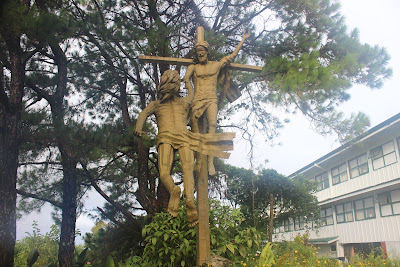"Devotio Ecology"
T
he UN General Assembly resolution 38/161 which established a special commission that should make available a report on the relationship between environment and development is turning almost 40 years since it was passed on December 19, 1983. That commission later adopted the name World Commission on Environment and Development (WCED). It published in 1987 the report entitled Our Common Future. It contained a definition of "sustainable development" that resonated so widely among environment and development pundits. Sustainable development was first defined in the report as "development that meets the needs of the present generation without compromising the ability of future generations to meet their own needs."
On June 18, 2015, Pope Francis took several steps further in bringing the urgency of the matter to the awareness of not only among Christians but every human being when he published his second and most revolutionary encyclical "Laudato Si'." Subtitled "on care for our common home," the Pope writes in critique of consumerism and irresponsible development and urges everyone to a "devotio ecology" or an act of deep reverence for all of life "while there is still time."
He laments that it is always the environment that bears the brunt of the insatiable human greed disguised as "development" which is the dominant modern "throw-away" approach. The Pope says, “lf we approach nature and the environment without this openness to awe and wonder, if we no longer speak the language of fraternity and beauty in our relationship with the world, our attitude will be that of masters, consumers, ruthless exploiters, unable to set limits on their immediate needs" (LS 11). He links the cry of mother earth with the cry of the poor whose human dignity is so severely impaired and desecrated. According to the Pope, these are not separate but just one indivisible crisis. The problematique, as the Holy Father has constantly pointed out, is in the inherent tension or conflict between development and sustainability.
Taking it one step further, UNESCO distinguished the two concepts as follows: "Sustainability is often thought of as a long-term goal (i.e. a more sustainable world), while sustainable development refers to the many processes and pathways to achieve it." With this in mind, church and civil society groups have moved forward in terms of creating spaces for dialogue along the path of sustainability. Pope Francis writes, “The urgent challenge to protect our common home includes a concern to bring the whole human family together to seek a sustainable and integral development, for we know that things can change” (LS 13). He continues, “I urgently appeal, then, for a new dialogue about how we are shaping the future of our planet” (LS 14). He draws attention most especially how, “Following a period of irrational confidence in progress and human abilities, some sectors of society are now adopting a more critical approach” (LS 19). The final paragraph of Before Nature Dies (1971), Jean Dorst’s writes,
“Man has enough objective reasons to safeguard nature. But in the last analysis it will only be saved by our hearts. It will only be saved if man loves it, simply because it is beautiful… . For that, too, is an integral part of the human soul” (Dorst 1971, p 329).
Laudato Si' Dev—short for devotion—is a sacred oasis for every living person on this planet called to enter not just into any dialogue but a loving one with all people, in order to develop ecological devotions of caring for Sister Earth, our Mother. It takes on the path of cultivating "ecological conversion" in the form of loving devotions, i.e., genuine responses to the cries of mother earth and the poor aka the eight work of mercy. 8thWorker.us


Comments
Post a Comment